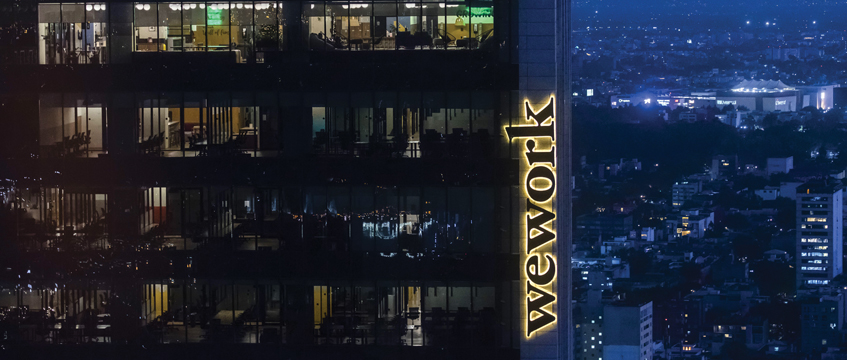The protracted troubles of WeWork will come as little surprise to many in the flexible workspace sector, culminating in reports of worrying 2019 losses and the “material impact” that Covid-19 has had on its financial position.
Undeniably, the office market has faced significant challenges this past year. Covid-19 has brought about lower occupancy rates, new health and safety pressures and an increasing volume of grey space on the market. In part, these struggles will have contributed to the growing losses reported by WeWork – but they are by no means the full story.
In fact, the pandemic has only accelerated a correction in a growing and increasingly crowded flexible workspace market. While others have proved far more resilient during this period of uncertainty, Covid-19 has furthered the decline of an empire that had been troubled from the very beginning.
Correction in the market
What has become increasingly clear throughout the pandemic is that the factors which fuelled WeWork’s over-expansion have also contributed to its decline.
Heavy investment from SoftBank flushed WeWork with cash, allowing the company to ‘blitzscale’ at a rate designed to dominate any viable competitors. As it expanded its UK footprint, the company entered into long-term leases typically including rent-free periods of up to five years, while at the same time offering relatively low prices to its members. From the outset, it should have been apparent that this was unsustainable, relying too heavily on high occupancy for the long-term, despite claiming to offer short-term flexibility.
Now, such a model appears to have come unstuck, revealing the risks of combining a leasehold-based operation with reliance on close to 100% occupancy in order to achieve profitability. Those operating a similar model and other density-dependent co-working spaces are likely to suffer even more keenly in the months ahead.
Other operators have proven more resilient, particularly those that own their building on a freehold basis and providers offering serviced office space rather than co-working. These are the operators which have been best placed to support their clients through the pandemic – without the shadow of rent obligations hanging over them.
Primed to thrive
So while WeWork’s struggles come as no great shock, by no means do they herald the beginning of the end for flexible workspace.
The pandemic has vastly accelerated a shift in what businesses want and need from their office space. While many have managed to work remotely, this is not a sustainable long-term option for businesses or their employees. In fact, a recent survey by Office Space in Town showed clearly the potentially harm of long-term home working for employees. It found that 25% of people reported an increase in feelings of anxiety working remotely, while almost a third lacked the appropriate equipment required to work at home successfully.
Nonetheless, businesses don’t want to return to the office as they left it. Now, they are favouring a more agile approach that can meet demand from employees for better work-life balance and protect revenues from expensive long-term leases. By offering shorter commitment and more responsive lease terms, flexible workspace is primed to cater to a post-pandemic surge in demand.
Like the proverbial Icarus, it seems from recent reports that WeWork has flown too close to the sun – its strategy for expansion and its dependence on density proving untenable in this pandemic. But while there are challenges ahead across the sector, many others have, since last March, repeatedly demonstrated their resilience. With business demand already shifting markedly towards flexible workspace, this is far from the end for the sector.
Niki Fuchs is managing director at Office Space in Town











